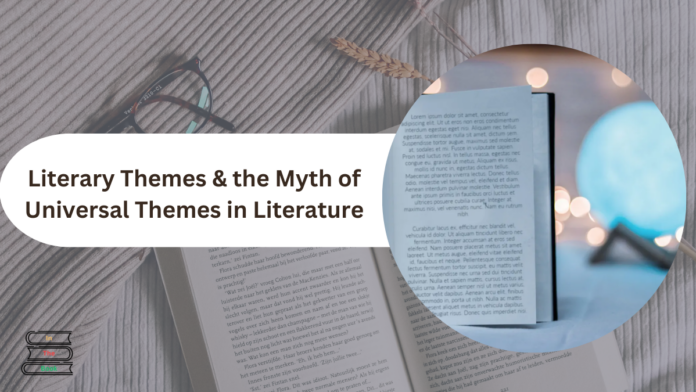Literary themes are the central topics or ideas explored in a work of literature. These themes often reflect the author’s views on society, human nature, and the complexities of the human condition.
While many themes are widely recognized and discussed, the concept of universal themes, that is, themes that resonate with all cultures and individuals, is more contentious. This article will explore both the common literary themes and the myth of universal themes in literature.
Contents
Common Literary Themes
Love is the most ubiquitous theme in literature. It encompasses a broad spectrum, from romantic love to familial love and even self-love. Works like Shakespeare’s Romeo and Juliet and Jane Austen’s Pride and Prejudice into the complexities and various manifestations of love.
This theme often underpins the moral framework of a narrative. It can be seen in epic tales like J.R.R. Tolkien’s The Lord of the Rings, where characters embodying good must confront and overcome evil forces.
The quest for personal identity and the exploration of self are central themes in many literary works. Novels like Ralph Ellison’s Invisible Man and J.D. Salinger’s The Catcher in the Rye explore the protagonist’s journey towards self-discovery and understanding.
Literature often examines how power can corrupt and the effects of such corruption on individuals and societies. George Orwell’s 1984 and William Shakespeare’s Macbeth are prime examples of how power can lead to moral decay and societal breakdown.
Also known as Bildungsroman, this theme focuses on the growth and development of a protagonist from youth to adulthood. Harper Lee’s To Kill a Mockingbird and Charles Dickens’s Great Expectations are classic examples of coming-of-age narratives.
The theme of survival against all odds is prevalent in literature, reflecting the human spirit’s resilience and determination. Works like Yann Martel’s Life of Pi and Cormac McCarthy’s The Road showcase characters struggling to survive in extreme conditions.
This theme explores the physical, psychological, or societal balance between liberty and restriction. Books like Margaret Atwood’s The Handmaid’s Tale and Ken Kesey’s One Flew Over the Cuckoo’s Nest highlight the human desire for freedom in the face of oppression.
The myth of Universal Themes
While the themes mentioned above are prevalent in literature and resonate with many readers, the idea of truly universal themes that is, themes that are understood and felt by all individuals across all cultures and times is more complex and debatable.
What is significant resonant in one culture might hold a different meaning in another. For example, the concept of individualism, often explored in Western literature, may be less prominent or relevant in collectivist cultures.
The interpretation of themes can be heavily influenced by the historical context in which a reader engages with a text. For example, a theme of rebellion against authority might be viewed very differently in a society experiencing political turmoil compared to one that is stable and democratic.
An individual’s personal experiences and background significantly shape how they perceive and relate to literary themes. A theme of loss, for instance, might resonate deeply with someone who has experienced personal loss but might not have the same impact on someone who has not.
Even the most beautifully crafted themes can only retain their impact if they translate well across languages. Subtleties and nuances in language can significantly affect how a theme is perceived and understood.
Case studies: Challenging the universal theme concept
While love is a common theme, its portrayal and significance can vary widely. For example, arranged marriages in many Eastern cultures present love differently than the romantic, often idealized love stories in Western literature.
The binary of good vs. evil is not always interpreted the same way. Historical contexts, such as periods of war or peace, can influence how these themes are understood. A wartime narrative might paint good and evil in stark, clear terms, whereas modern literature might explore more ambiguous moral landscapes.
The quest for identity can be a vastly different experience depending on societal norms and values. A character’s journey to self-discovery in a liberal society might differ greatly from one in a conservative or repressive society.
Conclusion
Literary themes are an important part of what makes literature impactful and enduring. While certain themes like love, good vs. evil, and the quest for identity are common and can resonate widely, the notion of universal themes is more complex.
Some Questions
What are some common literary themes?
Common literary themes include love, good vs. evil, identity, power and corruption, coming of age, survival, and freedom and confinement.
Why is the idea of universal themt the interpretation of themes?
Cultural norms and values can significantly alter the significance and understanding of themes, such as individualism vs. collectivism or different views on love and marriage.
Read More:
- The Real Reason Invoices Go Unpaid — And How Collection Automation Can Fix It
- Best Places to Buy Diamonds and Engagement Rings Online
- Building Focus and Strategy Through Interactive Digital Experiences
- How Students’ Reading Interests Influence Their Motivation and Performance in Writing Assignments
- The Damages Resulting from the Use of Suboxone

Chandler is an avid automobile enthusiast who is passionate about all things on wheels. From the latest car models to classic vintage rides, I love exploring the automotive world’s intricate details and engineering marvels. With years of experience in test-driving, reviewing, and analyzing cars, I provide readers with comprehensive insights and honest opinions.



























